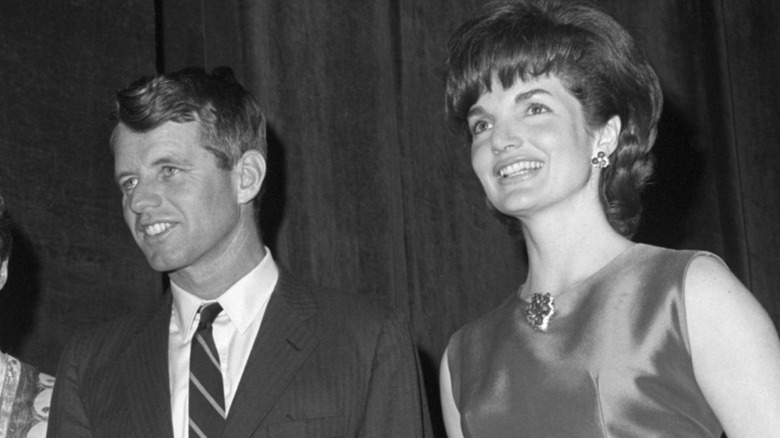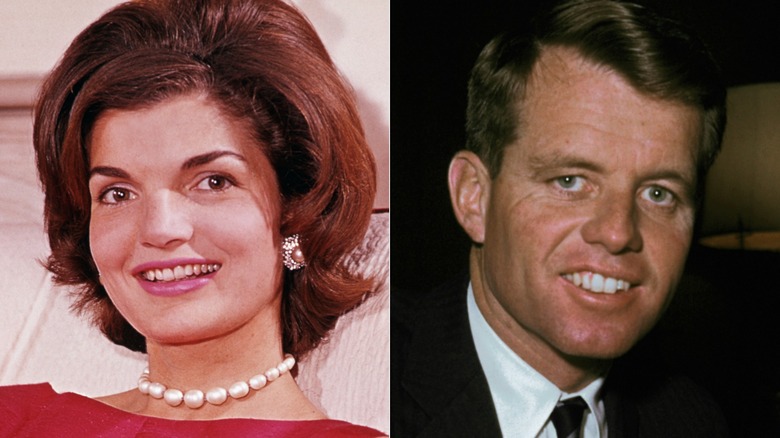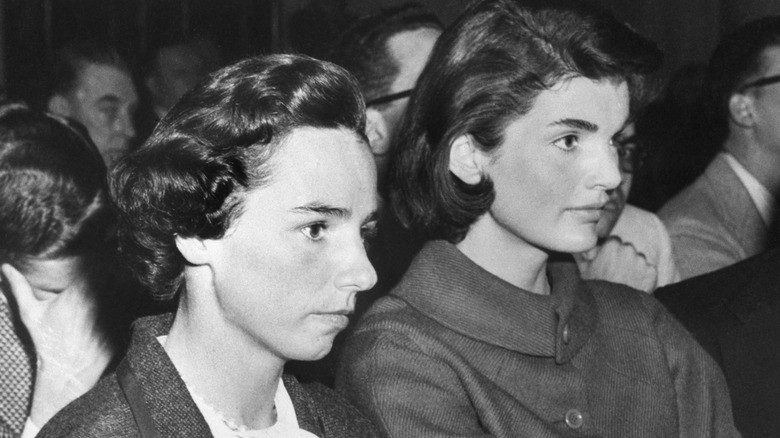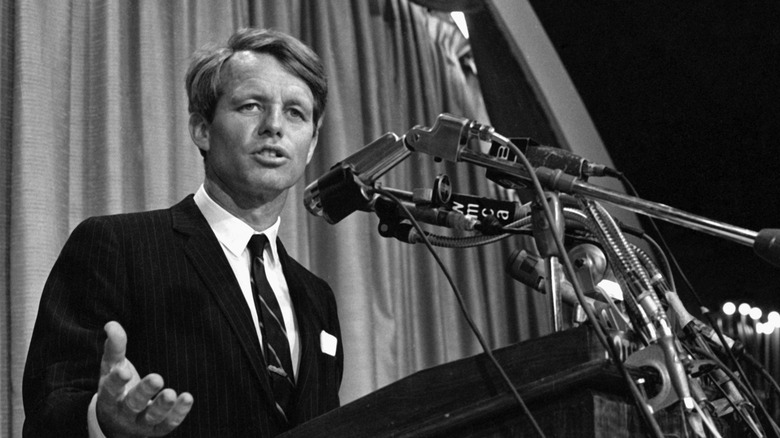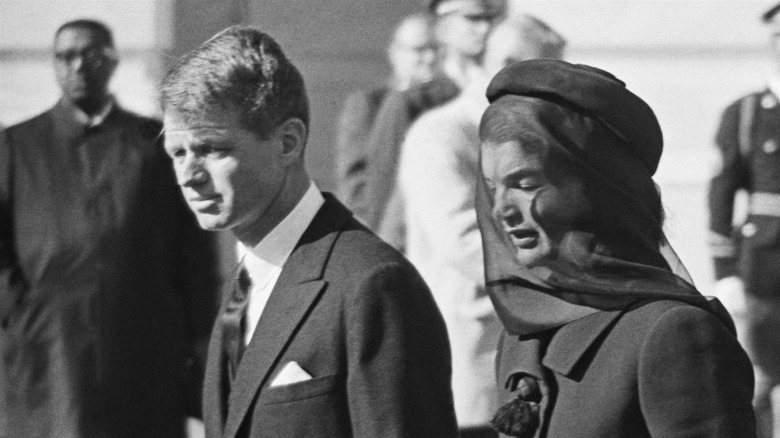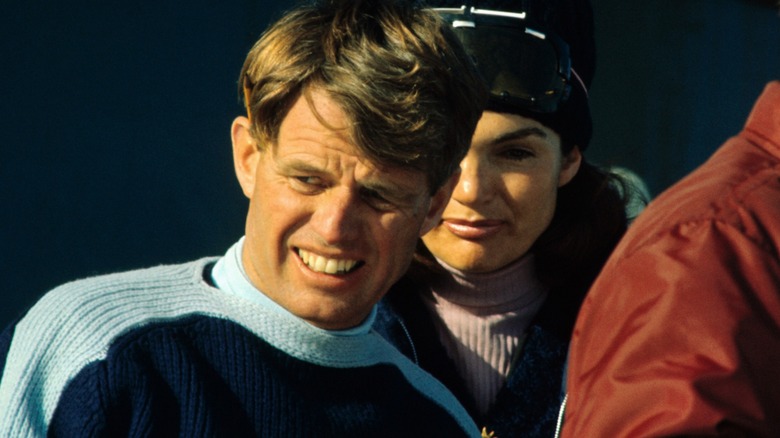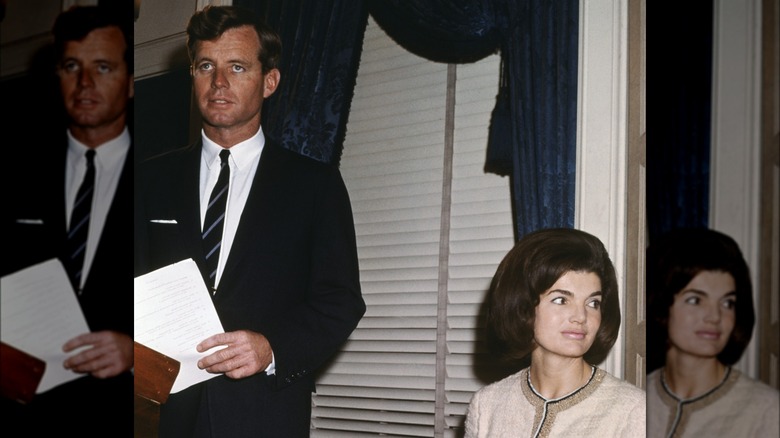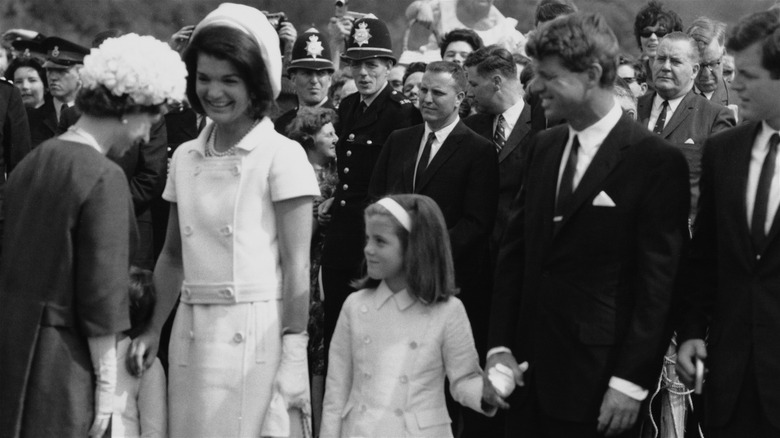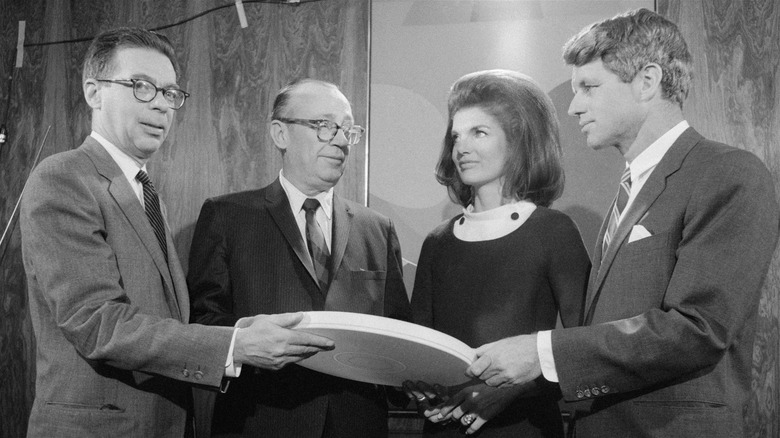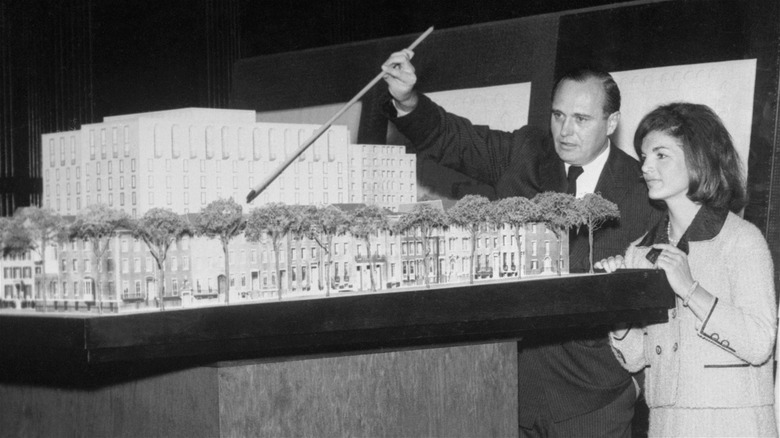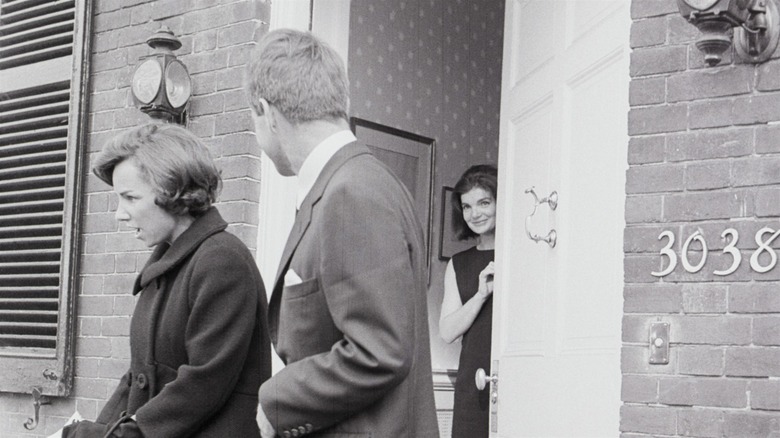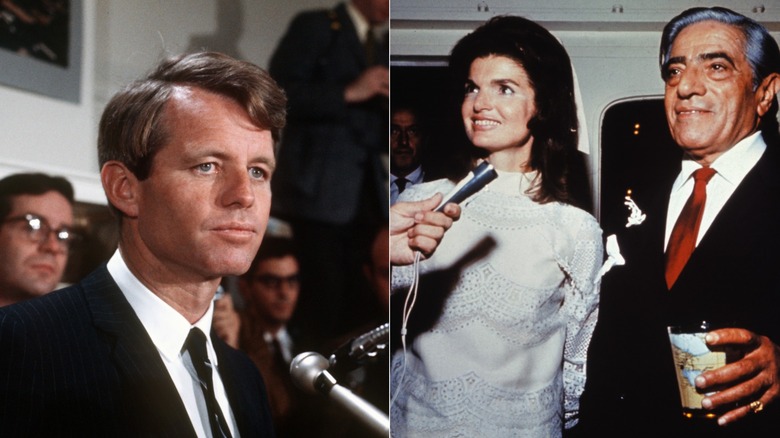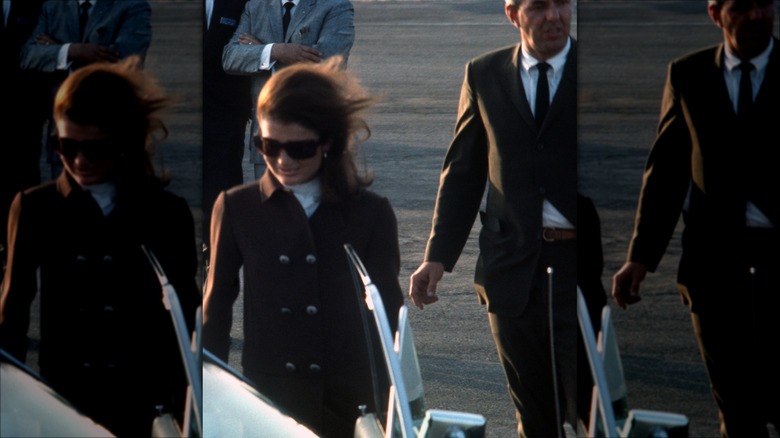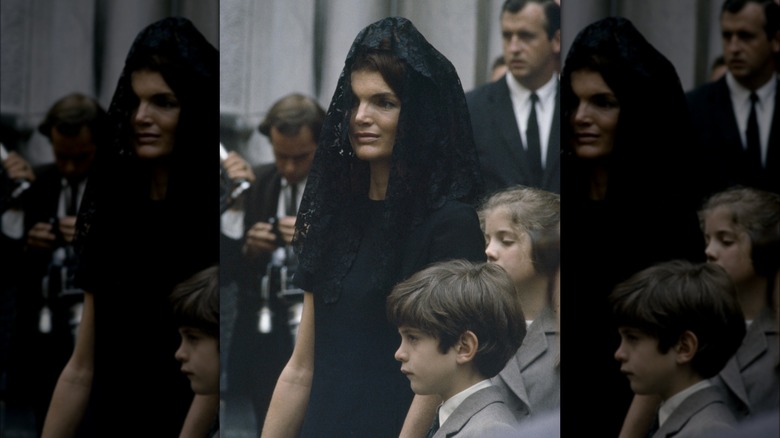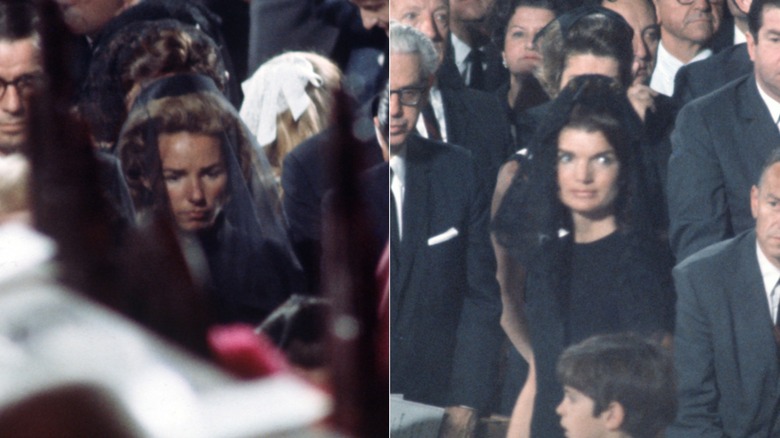Inside Jackie Kennedy's Relationship With JFK's Brother Bobby Kennedy
The Kennedy dynasty is the most famous political clan in America, a sprawling family that exerted incredible influence over much of the last century of American life. The Kennedys are also marked by tragedy; the family has suffered what seems like a neverending list of unfortunate incidents, from multiple murders and shocking accidents to numerous other deaths, divorces, and squabbles.
That experience puts a very human face on members of the family, and as a result, the public has always been fascinated by the Kennedys and their relationships with one another. At the center of the Kennedy mythos is President John F. Kennedy, who was famously assassinated in 1963. That left his wife, Jackie Kennedy, alone to raise their two children. JFK's brother, Robert F. Kennedy — commonly called Bobby, or RFK — followed in his brother's footsteps in several tragic ways. Before he became the second Kennedy to be assassinated that decade, however, Bobby struck up a close relationship with his widowed sister-in-law.
The exact nature of that relationship has been the subject of much speculation over the years. Was Bobby simply helping out with his niece and nephew, or was he getting closer to Jackie than he maybe should have? Were they working together to preserve John's legacy, or was something untoward going on? And how did their relationship — whatever kind of relationship it may have been — affect their relationships with other members of the Kennedy family?
Bobby Kennedy and Jackie Kennedy were alike
As Jackie Kennedy's assistant and occasional nanny to her two children, Kathy McKeon had a unique window into the lives of the most famous political dynasty in America. She worked for the family for years, and as such, was able to get to know the key players in the sordid sagas that played out in everything from the tabloids to the nation's papers of record. McKeon shared her memories in a book called "Jackie's Girl: My Life with the Kennedy Family," and several sections of the book zeroed in on the relationship between Jackie and her brother-in-law, Robert F. Kennedy.
One thing McKeon observed was that Jackie and Bobby had a lot in common. She felt that both were outwardly charismatic but actually introverted. She noticed that both loved athletics, writing, "They were big on being outdoors and loved their sports, especially the ones that called for self-discipline or personal strength." They were also both voracious readers. According to McKeon, Jackie was the one to suggest a quote from "Romeo and Juliet" for Bobby to read when he accepted a senatorial nomination, paying tribute to their dearly departed husband and brother. "When he shall die, Take him and cut him out in little stars," Bobby read. "And he shall make the face of heaven so fine that all the world will be in love with night, and pay no worship to the garish sun."
Jackie Kennedy didn't get along with Bobby Kennedy's wife Ethel
As the wife of President John F. Kennedy, Jackie Kennedy was naturally the most prominent wife of one of the Kennedy boys. That being said, Ethel Kennedy actually got there first; she married the younger Kennedy brother Robert F. Kennedy in 1950, while Jackie and John didn't wed until 1953. That means Ethel was a Kennedy back when Jackie was still Jacqueline Bouvier.
It seems that Ethel did not initially like the woman who would soon become her sister-in-law. According to New York Magazine, they bickered with one another when Jackie first visited the family in Hyannis Port. Ethel mocked the way Jackie pronounced her name, and she nicknamed her "the Debutante." When Jackie revealed that she once wanted to be a ballet dancer, Ethel made fun of Jackie's feet, drawing laughter from the other Kennedy women by declaring, "With those clod-hoppers of yours? You'd be better off going in for soccer." Ethel was even reported to have said of Jackie, "I don't think she has blood in her veins."
Jackie pushed back against the expectations of her as a Kennedy wife. She told a friend that she would refuse to comply with what the other women wanted of her, insisting that, unlike Ethel, she wouldn't be "a baby-making machine." She said, "I won't cut my hair. I won't have 25 kids." Their relationship would continue to have its ups and downs, especially over the eventful next two decades.
RFK defended Jackie Kennedy during his brother John F. Kennedy's campaign
John F. Kennedy ran for president in 1960, and the country was captivated by his relationship with his beautiful young wife. They already had a daughter, Caroline Kennedy, but during the campaign season, the couple announced that Jackie Kennedy was expecting again. Instead of joining her husband on the campaign trail, Jackie relaxed into her role at home, writing a syndicated column called "Campaign Wife" that took readers behind the scenes of the presidential election season. In her introductory column, she wrote (via the Portland Press Herald), "For the first time since Jack and I have been married, I have not been able to be with him while he is campaigning ... You can imagine how frustrating it is to be in Hyannis Port reading all that he's doing and not participating in any way."
Bobby Kennedy, on the other hand, hit the road in support of his brother. While speaking with the press, he faced questions about Jackie's role in the campaign. He defended his sister-in-law, telling CBS News that she would be doing as much as her obstetrician allowed. "She's doing as much as she can," he said, smiling patiently. "She was a tremendous asset to us in the state of Wisconsin and in the state of West Virginia, and of course, we miss her."
Bobby Kennedy was by Jackie Kennedy's side after JFK's assassination
John F. Kennedy was assassinated on November 22, 1963, in Dallas. Jackie Kennedy was sitting in the car next to him when it happened. She accompanied his body back to Washington, D.C., standing there on Air Force One in Jackie Kennedy's blood-stained pink coat while Lyndon B. Johnson was sworn in as JFK's successor. Thankfully, when the plane reached the capitol, Jackie had Robert F. Kennedy to lean on. According to PBS, as soon as he reached the plane, RFK went directly to Jackie's side, ignoring the new president.
During JFK's funeral procession, Bobby accompanied his widowed sister-in-law through the streets of D.C. Photos published in Vanity Fair showed the solemn expression on their faces, grieving together as they laid JFK to rest. After the burial, Bobby helped guide Jackie through the crowd as she held the American flag that had been draped over her husband's casket.
This all meant Jackie needed to move out of the White House. She found a home in Georgetown, near where Bobby and Ethel Kennedy lived. Bobby helped arrange a housewarming gift for Jackie, a tray engraved with the signatures of the men who had been in her husband's cabinet. "We want this to be a surprise," Bobby wrote in a letter to David Bell, head of the Agency for International Development. He gave it to Jackie in February, mere months after their loss. They would continue to be close in the years to come.
Bobby Kennedy ran interference for Jackie Kennedy
After the assassination of John F. Kennedy, the country wanted to hear from his wife. Jackie Kennedy recovered from her loss in private, but a few months after the assassination, agreed to an interview where she would, for the first time, tell the country what she experienced on that terrible day. The widow personally selected William Manchester as the writer to whom she would first describe her memories, but she was nervous to actually sit down with him because of how painful it was going to be.
In the meantime, according to Vanity Fair, Robert F. Kennedy met with Manchester to hash out the details of how it would go. Bobby, it seems, told Manchester that he was speaking on Jackie's behalf and that there was no reason for Manchester to meet her until she was ready. They hashed out an agreement that involved Manchester promising not to publish the interview "unless and until approved" by both RFK and Jackie herself, giving them both the chance to go in and alter any quotes that would result from the eventual meeting.
A few years later, after hours of interviews, Jackie and Bobby made headlines when they tried to get Manchester to edit the book, now titled "The Death of a President." Vanity Fair chronicled the argument and fallout, which saw Manchester hospitalized. Bobby asked him, "Do you think you've suffered more than Jackie and me?" Ultimately, they settled, and only minor changes were made.
Jackie and Bobby Kennedy helped each other recover from loss
Jackie Kennedy's assistant Kathy McKeon noted in her memoir "Jackie's Girl" that the presidential widow's close relationship with her brother-in-law was one forged by mutual loss. McKeon saw how they comforted one another, and wrote, "Loss is a terrible love ... When it happens in a swift, horrific instant, there is no such thing as healing ... I could see plain as day that this awful shared knowledge was what made the president's widow and younger brother care for each other the way they did."
During an appearance on "The Jack Paar Program," Bobby was asked how his sister-in-law was handling her grief. Though he knew she was still struggling, Bobby told Paar, "She spends most of all of her time with their children now, and I think she's making a good deal of progress." Shortly after Bobby's televised interview, they went to Antigua. Bobby borrowed a book from Jackie and spent much of his vacation reading it. "I remember he'd disappear. He'd be in his room an awful lot of the time," Jackie recalled, according to Vanity Fair.
Jackie encouraged Bobby to read "the classics" to help with his pain, according to PBS. His favorite Aeschylus passage read, "He who learns must suffer. And even in our sleep pain that cannot forget, falls drop by drop upon the heart, and in our own despair, against our will, comes wisdom to us by the awful grace of God."
Bobby Kennedy was a great uncle to Jackie Kennedy's kids
After John F. Kennedy died, Bobby Kennedy took an active role in helping raise JFK's children, Caroline and John Jr. Kennedy. On "The Jack Paar Program," Bobby confirmed that he and his brother, Senator Ted Kennedy, visited the family regularly. "[Ted] goes over and tells them stories at night after he finishes work," Bobby said, denying press reports that he read the kids comic books. He added, "... Dave Powers, who worked for my brother at the White House, who was a great friend for many, many years, goes over at lunchtime and has lunch with John, so they see some men in their lives now."
In "Jackie's Girl: My Life with the Kennedy Family," Jackie Kennedy's assistant Kathy McKeon wrote that Bobby came over for dinner at least once a week. "Bobby would toss John into the air and catch him, then get down on the floor to play," McKeon recalled. "... Bobby stepped easily into the role of surrogate father for John and Caroline, and they worshiped him. [Jackie] clearly leaned on him, too." McKeon wrote that, when the kids were acting out, Jackie would threaten to tell their uncle about their actions.
John's friend and biographer Steven M. Gillon wrote in the book "America's Reluctant Prince" that Bobby offered guidance to his young nephew. "You're a Kennedy," he once told John. "... You have been given special privileges, and you have a responsibility to help other people."
Bobby and Jackie Kennedy worked together to preserve JFK's legacy
In the period of mourning following John F. Kennedy's assassination, Jackie and Robert F. Kennedy teamed up to secure their lost loved one's legacy. Both were heavily involved in the creation of the John F. Kennedy Presidential Library, with RFK announcing the project mere weeks after the assassination. According to The New York Times, he revealed the undertaking of an oral history project that would gather interviews with as many people who knew his brother as possible, making everything available to the public. "The library will belong to the people, and we want as many as possible to participate in it," he said. Along those lines, the newspaper reported a few months later that, according to Jackie, more than 18,000 donations from the public had helped raise over $4 million for the library.
Jackie released a statement in 1964 about their plans for the library, according to the library's website. She mourned the fact that her husband would not be around to see the library dedicated in his honor. "... His parents and brothers and sisters and I all look on it as his most fitting memorial," she wrote. "Because John Kennedy was so involved in life, his library will be not just a repository of papers and relics of the past. It will also be a vital center of education and exchange and thought."
Bobby Kennedy disapproved of Jackie Kennedy's romance with Jack Warnecke
After the assassination of her husband, Jackie Kennedy looked for someone to design the Eternal Flame memorial at Arlington National Cemetery. She found John "Jack" Warnecke, an architect who had previously worked with JFK in order to develop initial plans for his Presidential Library.
According to biographer J. Randy Taraborrelli, Jackie Kennedy and Jack Warnecke fell into a relationship. His book "Jackie: Public, Private, Secret" detailed a phone call in May 1964, a scant six months after John F. Kennedy's assassination, in which Warnecke called to ask Jackie out to dinner. "I don't date, Jack, and I never will again," she told him (via People). He showed up anyway, reminding her that she didn't technically say no. Later that year, Jackie brought him to the Kennedy compound at Hyannis Port. "We had dinner — clam chowder — and talked until the sun went down, and then talked beyond that ..." Warnecke told Taraborrelli. "Then, one thing led to another ..."
It seems that Bobby Kennedy disapproved of the relationship, telling her that she was moving on too quickly. Jackie responded, "This is none of your business, Bobby." The relationship lasted three years, however, it ended when Warnecke admitted to Jackie that he was a million dollars in debt. Jackie, it seems, ghosted him. When John Jr. asked his mother if Mr. Jack would be visiting, Jackie reportedly answered, "No, honey. We won't be seeing Mr. Jack again."
There were rumors of an affair between Bobby and Jackie Kennedy
It's no secret that Bobby and Jackie Kennedy became incredibly close after the death of John F. Kennedy. What is still being debated, however, is just how close they were. According to "Bobby and Jackie: A Love Story," they had a years-long affair, with the full knowledge of many people in their inner circle. The book features interviews with figures like Truman Capote, Gore Vidal, and historian Arthur Schlesinger. Franklin Roosevelt Jr., JFK's Undersecretary of Commerce, told the book's author C. David Heymann, "Everybody knew about the affair. The two of them carried on like a pair of lovesick teenagers ... I suspect Bobby would've liked to dump Ethel [Kennedy] and marry Jackie, but, of course, that wasn't possible." According to Heymann, Roosevelt even went with the duo to get drinks with actor Richard Burton, who drunkenly told them they should get married.
According to J. Randy Taraborrelli's book "Jackie: Public, Private, Secret," Jackie and Bobby were once spotted holding hands in public. This time, the news made it back to Bobby's wife, Ethel Kennedy. Jackie's younger brother Jamie Auchincloss told Taraborrelli that Ethel confronted Jackie about all of the rumors. "Jackie was mortified and said she would never do something like that, and that was the end of it," Auchincloss recalled. "Ethel believed her."
Whether the rumors are true is perhaps lost to history. What is clear is that, soon enough, there would be a new man in Jackie's life.
Bobby Kennedy asked Jackie Kennedy not to marry Aristotle Onassis
In 1968, Jackie Kennedy was pursued by Aristotle Onassis, a shipping tycoon who had previously tried to woo her sister Lee. Jackie's assistant Kathy McKeon wrote in her memoir "Jackie's Girl" that she was somewhat confused by the union. "It was hard to tell by Madam's business-like demeanor whether she was happy," she wrote. "... She and Mr. Onassis seemed like friends, not a couple."
That same year, Robert F. Kennedy was gearing up to run for president. Assessing his political chances, he realized he might have an issue: His sister-in-law's new relationship. After all, Onassis never liked the Kennedy brothers. A book called "Nemesis: The True Story of Aristotle Onassis, Jackie O, and the Love Triangle That Brought Down the Kennedys" detailed the animosity between them, which dated all the way back to a high society party in 1953. Sir John Russell told the book's author that, that night, Bobby Kennedy and Aristotle Onassis fought "like a couple of Kilkenny cats."
According to New York Magazine, Bobby tried to intervene in Jackie's love life, asking her not to marry Onassis for fear of how it could affect his campaign. "[A marriage] could cost me five states," he told her. She agreed to delay any nuptials until after the election; unfortunately, Bobby would not live that long, and Jackie Kennedy became Jackie Kennedy Onassis in October of that year.
Jackie Kennedy flew to Los Angeles upon learning Bobby Kennedy had been shot
In 1968, Robert F. Kennedy ran for president, aiming to hold the office once occupied by his brother. The campaign was going well; that June, he won the California primary. At the Ambassador Hotel in Los Angeles, he gave a victory speech and then was led through the hotel kitchen to make his exit. There, he was shot by a man named Sirhan Sirhan. A teenage busboy named Juan Romero later told NPR, "I put my hand between the cold concrete and his head just to make him comfortable. I could feel a steady stream of blood coming through my fingers."
Upon learning that her brother-in-law had been shot, Jackie Kennedy got on a plane to Los Angeles. News cameras at the airport captured the former First Lady sobbing in the arms of a man identified as Burke Marshall, Vice President of IBM. She was taken to the hospital, where Bobby had been kept on life support. According to "America's Queen: The Life of Jacqueline Kennedy Onassis," speechwriter Richard Goodwin recalled, "Jackie was the one who turned off the machines. She flew in and nobody else had the nerve."
Lady Bird Johnson noticed how distraught Jackie was at Bobby's funeral, which took place two days later. "She looked at me as if from a great distance as though I were an apparition," Johnson said. "... I had the feeling that she must have been given a sedative."
Jackie Kennedy couldn't bring herself to tell her kids about Bobby Kennedy's death
Jackie Kennedy's assistant Kathy McKeon had the day off when Bobby Kennedy was killed. She wasn't watching television and hadn't heard the news until a fellow Kennedy employee showed up at her door and told her she needed to get to work. She packed a bag, including a black dress for the upcoming funeral, and headed to Jackie's house. When she reached the home, McKeon found a throng of onlookers gathered outside.
Inside, she found Jackie, who had clearly been crying. McKeon recalled that her boss asked her to please talk to her children on her behalf, as she couldn't bring herself to tell them what had happened to their uncle. McKeon told Jackie that she was sorry to hear the news, and Jackie said, "Same story all over again." Clearly, her husband's assassination was on her mind. John F. Kennedy's widow then added two sentences that McKeon said she would hear many more times as Jackie processed the loss of her brother-in-law. "We'll all miss him dearly," Jackie said. "He was a second father to my children."
Jackie Kennedy wrote a letter to Bobby Kennedy's widow
Jackie and Ethel Kennedy initially weren't big fans of one another. But by the time Robert F. Kennedy was assassinated, however, it appears that the two women had made up. After all, they now shared a terrible bond that few other people in the world could understand.
In the days following Bobby's death, Jackie wrote a letter to her brother-in-law's wife. According to People, the letter read in part, "I stayed up till 6:30 last night just thinking — and praying for you — and for you in the months ahead — I love you so much." Jackie clearly had Ethel and Bobby's children on her mind, knowing how her own kids suffered in the wake of their father's murder. She concluded the letter by offering, "I'll take them around the world + to the moon + back — anything to help you + them now and always."
The letter was owned by a private collector, but according to CNN, the Kennedy family alleged it had been stolen. The FBI tracked it down after Ethel told them, she "never gave the letter to anyone to keep and under no circumstances would anyone have the authority to transfer ownership of the letter to anyone." As of 2011, according to The Dallas Morning News, a judge decided not to prosecute anyone, but the fate of the letter was unclear. Thanks to the transcript, though, we'll always have the sign-off: "With my deepest deepest love, Jackie."
